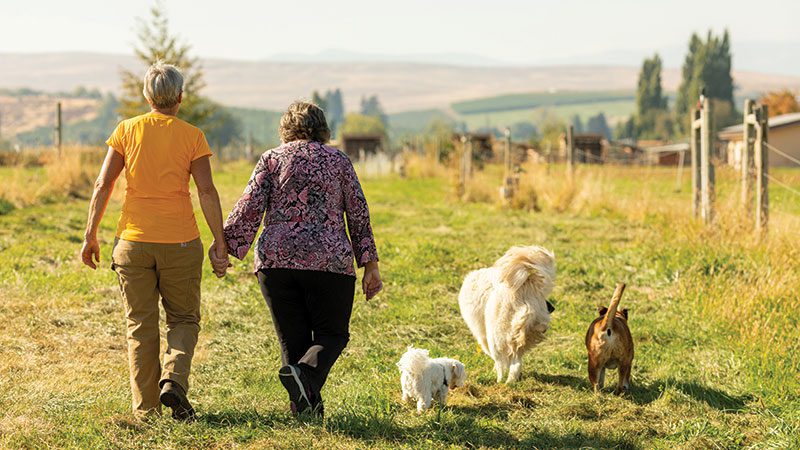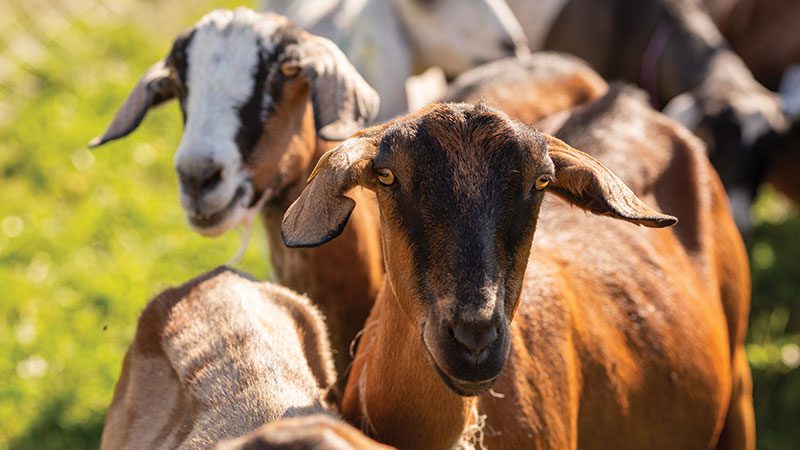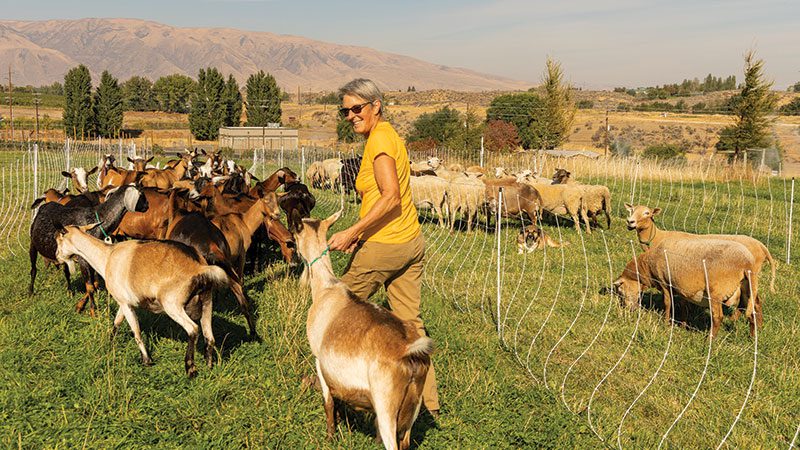Farmstead creamery has “a little bit of magic”
By Rebekah Denn, photos by Meryl Schenker
This article was originally published in March 2023

TIETON—Phoebe, Rheba, Bianca, Calypso—fans of Tieton Farm and Creamery know their favorite cheeses by name.
At this 21-acre farm west of Yakima it gets even more personal. Owners Ruth and Lori Babcock know the animals who produced the milk and who loaned their names to the cheese. The roughly 30 goats and 40 sheep deserve their headline status—without them there’s no creamery—but they don’t work alone.
The Babcocks, of course, are the vision and labor behind the small farm, which produces award-winning cheese sold at PCC stores and farmers markets. Both had earlier careers in tech, with experience between them in business, accounting and software engineering. In the last 20 years they’ve added expertise in animals, vegetables, soil and milk—and how both people and processes work together.
Lori is head cheesemaker, while Ruth oversees the animals and vegetables along with a farm manager.
The farm “is a little bit of everything, it’s not a lot of one or two things,” Ruth said. That includes chickens and their eggs, pigs and a few beef cows, spinach and squash and other crops for Yakima customers.
Lori is a former chair of the PCC Board of Trustees, serving in the late 1990s and early 2000s, and it’s no surprise the farm operates with sustainable practices.
“It’s not a mono-process… it’s the way it’s always been done,” Ruth said. (Though not the way most farms operate now.) The farm had been an apple orchard, but had not been in production for seven years, so they could make organic products from the start.
It is solar powered. Animals eat non-GMO, locally sourced feed— including whey from cheesemaking for the pigs—and graze on pastures maintained without herbicides or pesticides, moving regularly from patch to patch.
“After the pigs are there it grows the lushest, greenest grass you’ve seen in your life,” says Lori, pointing to one field.
“Pigs are nature’s rototiller.”

It takes a few minutes to walk from the grazing animals to the sterile cheesemaking facility where Lori carries steel cans of warm milk inside or wraps rounds of soft cheese at the window. Production is highly seasonal—“We only milk once a day when the babies are being fed,” Lori said—and the percentages of goat milk and sheep milk in their cheeses varies along with the season. “They peak at different times. But that’s part of why it’s OK to be small, then I can manage those changes.”
That’s part of what it means, Lori says, to be a true farmstead. “Here are the animals. We don’t have thousands of them,” she said, gesturing around her. “The milk belongs to me, it doesn’t belong to Darigold (dairy co-operative). It doesn’t travel far to where it’s made.”
Lori had culinary training years ago and also was introduced to cheesemaking while living in France for two years. Returning to the U.S., she took cheesemaking courses at Washington State University, an approach she recalls as heavy on chemistry but less focused on character. The creamery came so she could make and share the kinds of cheeses she wants to eat, from spreadable Bianca to fresh-brined feta, aged Romano-style wheels and an Epoisse washed with pear brandy. Turning passion into business involved a lot of experimentation and development—and respect for her muses, the Kathadin and Fresian sheep and the French Alpine and Nubian goats.
The Nubians “give you the milk that’s the milk of the gods,” she said, though she has a weakness for the “heh heh” bleat of the French Alpines.
Both cows and goats are often chosen in large operations for productivity and predictability: “milk strains for your industrial milk… low butterfat, low flavor, blah blah boring cheese.” She got to select instead for “really interesting milk.”
She might like a few dairy cows to join their herds one day, along with the handful of beef cattle they raise now. That would require a larger milking facility, though, and another addition to their daily responsibilities. Why even consider it?
“Mozzarella,” Lori said with a dreamy sigh.
The results have been outsized, with creamery cheeses winning honors like the People’s Choice award at the Washington Artisan Cheesemakers Festival.

Courtney Johnson, executive director of the Washington State Cheesemakers Association and a former PCC cheesemonger, wrote on her “PhCheese” blog in 2017 that Tieton’s Black Pearl was the best cheese she ate that year, extolling the “wondrous cloud” of its silky center and the mushroomy rind. “It is the type of cheese that you take a bite of, ponder, and then say, “Oh god.”
The markets, PCC, and a few restaurants like Seattle’s Lark and La Medusa are currently their main outlets. People ask frequently if the Babcocks will ship the cheese, but they’re reluctant. “Shipping perishables, that’s a really tough thing to do for the environment. We’re talking Styrofoam, ice gel packs, resources that are not even recyclable.”
The couple have endured natural disasters and economic stresses over the years, including the Great Recession and the time a nursing mother sheep kicked over a heat lamp and the building caught fire. “We didn’t even lose that sheep or that baby. Wool’s an amazing thing,” said Ruth. But they lost financial ground that took years to recoup.
There are still challenges and hard work—and redeeming factors. Seeing the milk coming inside in the morning, still warm in the cans, “I think this is the most amazing thing on planet Earth,” Lori said. Coaxing it into cheese takes her senses as well as her hands. The moments when the curds form are almost elemental.
It’s “a lot of science and a little bit of magic,” she said. She controls the time and the temperature and the environment. But “I don’t control the milk.”
